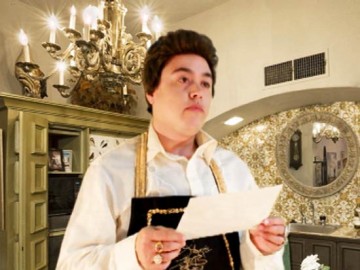Chris E. Vargas and I went to high school together at Grover Cleveland High, a public school in Reseda, in the San Fernando Valley area of Los Angeles. The tattooed 818 on his arm is an area code in the Valley. My own area code was 213–I lived in Hollywood–and when LA changed to the 323 area code it felt like a huge betrayal. So I can relate to his connection to those three numbers. Our paths on opposite coasts haven’t crossed, but we’ve stayed in touch the old-fashioned way, through email and letters. Chris is an incredible letter-writer. One of my favorites was the announcement of his graduation from UC Santa Cruz. What was profound about it was to see his name printed so officially, because Chris used to be Christina and this beautifully embossed card announced his decision, and I felt proud of him.
Over the years Chris has amassed a huge number of videos and online followers. We haven’t seen each other in person in probably 10 years. An enormous sense of humor pervades everything he does. That’s how its been since high school–he helped make it tolerable for me. Here’s an excerpt from one of our recent online conversations.
Chris Vargas: I miss L.A. and the San Fernando Valley. Don’t you? I love my life in the Bay Area but I miss the people in LA. I know there’s a firmly-grounded stereotype that runs contrary to this, but I’ll say it anyway: people are so nice there! It must be the sunshine. I’m also jealous that there’s so much good art there, and I’m not around to appreciate it.
Rachel Mason: YES!!! L.A. gets such a bad rap. Most L.A. natives that I know are also the most grounded, almost midwesternly… definitely contrary to the stereotype….Their public transit system does suck, but it’s a great place to ride a motorcycle.
CV: Thanks, Rachelssance. Are you going to tell your readers that that was your highschool nickname? Because you looked like a Renaissance painting, specifically, the Mona Lisa.
RM: Sure! I loved the spinoffs and variations…. Rachelssance is my fave.
Sometimes I wonder if I’m doing what I always imagined I would be doing when I was a kid. When I think back, I do kind of think that I am doing pretty much what I expected. Do you feel like you’re doing what you’d always imagined or hoped you’d be doing? If not, what was the other thing you thought about doing? And is this different?
CV: I don’t remember what I imagined my life would look like when I was a kid. I didn’t ever think I was particularly talented at “art” so I’m quite sure I never imagined that at age 30-ish I’d call myself an “artist.” Actually, come to think of it, the first occupation I said I wanted to be was a cartoonist. Then I think I wanted to be a dancer. Both kinda make sense now as I perform in roles and make videos that are sometimes comic.
RM: I just re-watched Falling in Love with Chris and Greg – and I was dying–it’s really, really funny. My favorite episode is still the first one [O Canada!, 2008]. Can you tell me a little about how those shows developed?
CV: Greg Youmans, my collaborator and real-life boyfriend, really had some stuff to work out! Which is why we started the project. The characters we play are caricatures of ourselves. The issues that we deal with onscreen are not dissimilar to what we deal with offscreen, but they are of course blown way out of proportion. We are engaged with a history of television comedians who use themselves and their lives as comic fodder.
RM: How do you think that being outside of the mainstream allows you to do what you do now that you couldn’t if you were part of the entertainment industrial complex?
CV: The topics that the show addresses are really specific to a certain kind of queer experience and to our own experience in a trans/non-transgender gay relationship. I think the relationship dynamics are really average, but the particular issues that we address—male pregnancy, queer marriage, testosterone-induced hair loss—are specific to our experience and are not issues common to primetime TV. But it’s true, the television conventions and the “odd-couple” relationship that we use are nothing new. We’re not trying to subvert the sitcom genre, we’re squeezing ourselves into it, and we’re using its really familiar language to talk about a really specific experience.
RM: What do you think would be different about the show if you actually (and hopefully) get it out to a mainstream audience, like comedy central or HBO? Do you think that if the mainstream truly embraced gay culture, that we might lose the joy of “Trashy Queer Camp”?
CV: I can’t speak for Greg, but I never had a goal to deliver this show to a mainstream audience. Because we are speaking to a very specific experience and because we’re using very particular queer vernacular, I would be concerned about the “universalizing” process we’d have to undergo to make our show appeal to a larger audience. I think the strength of the project is that we’ve identified the specific audience whom we want to speak to, and it’s for them and ourselves that we make these videos.
I followed the story of Thomas Beatie (“The Pregnant Man” as seen on Oprah and in all the tabloids!) in the media pretty closely. Do you know about him? He announced to the world in The Advocate and then on Oprah that he was a transgender man and that he was pregnant. People had such a strong response to his story. His declaration that he was a conventional man despite having the female reproductive organs and the desire to carry a child blew the minds of people who had no concept of transgender-anything! He attempted to assert a very conventional heterosexual masculinity all the while being pregnant and it was too much for many people to handle. Lots of transgender people, as well as non-trans people, called his gender identity into question because they couldn’t understand why he’d want to carry a child. I was very critical at first, mostly of his really normatively gendered portrayal of himself, his wife, and his family, but then I did more research. I read his autobiography and watched hours and hours of interviews with him, and I developed a real protectiveness and compassion for him. So, all this is to say that I made a video about it, Extraordinary Pregnancies, wherein I take Barbara Walters’ interview footage and re-script Thomas Beatie’s answers and perform as him. I tried to bring together the conflicted feelings I had over his story, the compassion and criticism as well as my own identification and investment in him as a transgender person.
RM: I’d be curious to know what inspired you to make the video in that way. I really thought it was effective in actually turning our attention to the way that he was being interviewed and sensationalized, and making him be a more relatable person. At the end of the interview, Barbara seems to be the real “freak.”
CV: Yeah, Barbara is relentless in this interview and quite insensitive.
RM: And I wonder about something else, because I saw a link on your Facebook page to Chaz Bono. How do you see the role that he is having right now in the mainstream media?
CV: As you may be able to tell, I’m very interested in the very calculated self-representation of transgender people to a mass-media audience. I’m also interested in non-trans as well as transgender audience response to these people. Because there are so few examples that exist, there’s so much pressure for that one person to accurately represent an entire community. Enter Chaz Bono, the famous offspring of Sonny and Cher. I’ve been trying to watch Dancing With The Stars just for Chaz but I lose interest really quickly (it’s no So You Think You Can Dance!).
I can’t imagine the pressure of growing up in the spotlight, meanwhile trying to decide who you are and what you want to do with your life. I think it was really hard for Chaz in the beginning. I read the book The End of Innocence by Chastity Bono (Chaz pre-transition) which is his lesbian coming-out story, and that was heartbreakingly difficult! From what I can tell, Chaz is being a good sport. I watched that David Letterman interview and while there were some cringe-worthy moments, especially relating to the bluntness of the interview style, he handled it so well. He is a very poised speaker about FTM (female-to-male) transgender issues.
And it’s true, it’s so ridiculous that it’s become a joke among transgender people that people feel brazen enough to ask us about the details of our anatomy. Geez! On one hand, I do feel critical of Chaz especially as it relates to his real rigid distinctions of gendered behaviors, and some weirdly misogynist things he said in a New York Times article for the most part. But on the other hand, I appreciate what he does and that he keeps it specific, always prefacing what he says as his own personal experience. I was recently fantasizing about making a video with my mom as Cher because I think they’re both having or have had a difficult time coming to terms with their transgender kids, but there’s nothing in the works just yet. I’ll let you know!
RM: You have to!! And I’d love to hear you say something about your most recent piece, with Liberace. I’ve always found his story fascinating and was delighted that you took him on in your work! (Did you know that he had a house up the street from me? — kind of random!).
CV: Did you know Liberace also had a house in the San Fernando Valley in the hills of Sherman Oaks?! It has a piano-shaped pool that you can see from Google Earth! For that video project I did a bunch of really fun research: I visited his Vegas museum before it closed last fall, read his biographies, and poured over his books with hundreds of pictures of his home interiors. He really lived up to his title of “Mr. Showmanship.”
I initially fell in love with him when I visited his museum for the first time sometime in the late 1990s. Again, I was drawn to him for his style but mainly because of the glaringly huge contradictions in his life: the fact that he was a flaming rhinestoned homo and yet was so adamantly not queer. In the video, I re-narrate portions of the biography of Liberace in order to insert him into a queer history of radical AIDS/HIV activism. In other words, I position Liberace’s life and death as the catalyst for direct action tactics used by activist groups such as ACT UP (AIDS Coalition to Unleash Power). Again, like Extraordinary Pregnancies, it’s a video partially made out of my own wish fulfillment. I love Liberace but I really wanted him to be a different person, politically. I wanted him to be out and enraged by the government negligence in the early years of the pandemic. So in the video, I embellish some biographical details and rescript Liberace’s motivation for sending Ronald and Nancy Regan a beautiful chocolate piano, which he actually did.





